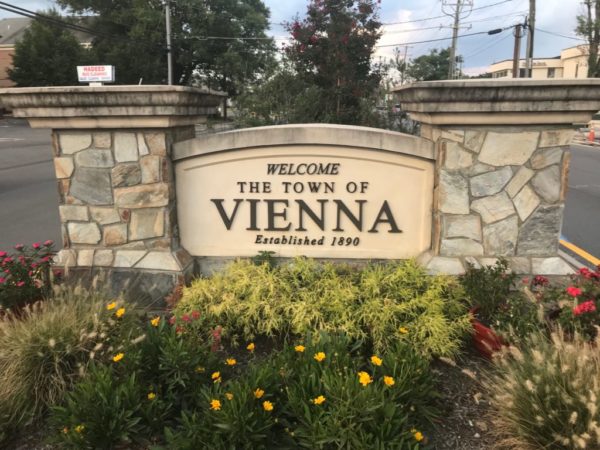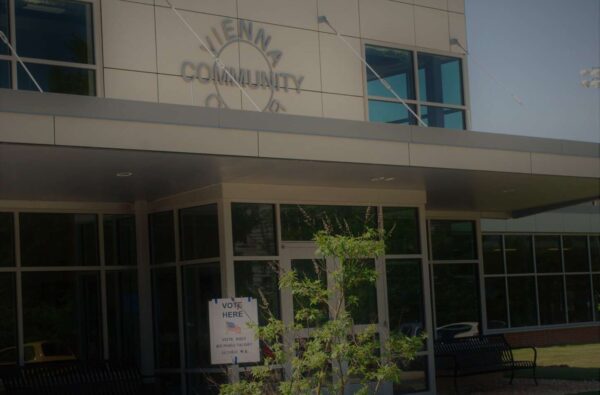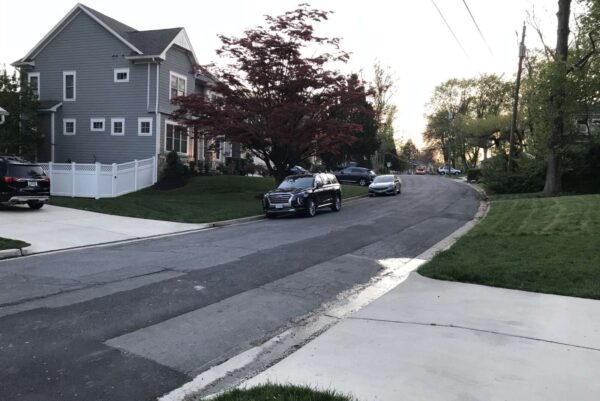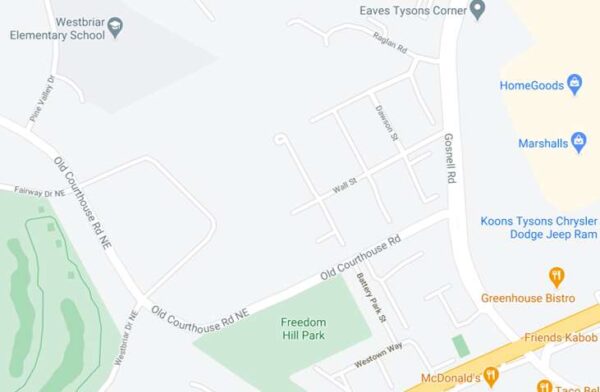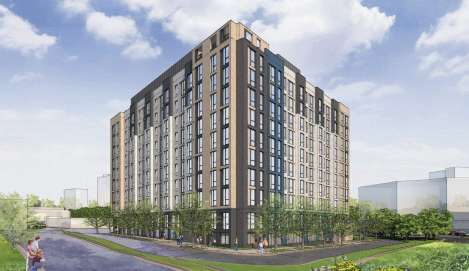
The Fairfax County Board of Supervisors moved forward yesterday (Tuesday) with plans to use public funds to help build an affordable housing project near the Spring Hill Metro station in Tysons.
Part of the planned Dominion Square West development, the nine-story, 175-unit project comes from the nonprofit Arlington Partnership for Affordable Housing (APAH).
Units will have one to three bedrooms and be reserved for those at or below 30%, 50% and 60% of the area median income. Those thresholds are currently $31,000, $51,600, and $61,920 for a two-person household for the D.C. area.
The project received the Fairfax County Planning Commission’s approval on Jan. 12.
With yesterday’s 9-0 vote, the Board of Supervisors agreed to buy two acres of land for the property with $10.97 million in American Rescue Plan Act money as well as $10 million from a Fairfax County Redevelopment and Housing Authority reserve fund.
Hunter Mill District Supervisor Walter Alcorn said the project will provide “much-needed housing.”
“The 175-unit Dominion Square West building will be a significant and positive step forward in providing affordable housing for working families close to Metrorail,” he said, adding that he looks forward to the “life-changing impact” it will have on residents.
Located at 1592 Spring Hill Road, the property is currently a parking lot owned by Capital Automotive Real Estate Services, a real estate investment trust acquired by Brookfield Property Partners in 2014.
Fairfax County will pass the money for the land to APAH, but it will retain public ownership of the ground, which will be leased to the nonprofit for 85 years.
Housing authority spokesman Ben Boxer said in an email yesterday that financial terms of the leasing arrangement are still under negotiation.
“Negotiations on the terms are anticipated to be completed in the next month,” Boxer wrote.
In addition to the ARPA and housing authority reserve funds, the county’s $43 million contribution to the project includes $13.3 million in local tax money from a Housing Blueprint Fund, according to Boxer.
The housing blueprint funds and developer contributions from the county’s Tysons Housing Trust Fund will help pay for a $22 million subordinate loan to APAH to support the project’s construction.
The trust fund was established in 2010 by the Tysons Comprehensive Plan, which recommends that developers give $3 per square foot of non-residential development to fund affordable and workforce housing in the area.
The Dominion Square West project is the first one to use that money.
“Dominion Square is the kind of community we need more of — one that is completely integrated into the community in terms of design, function, and opportunity,” Board of Supervisors Chairman Jeff McKay said in a statement. “I strongly believe quality affordable housing must be available throughout Fairfax County and this action helps move us closer to that reality.”
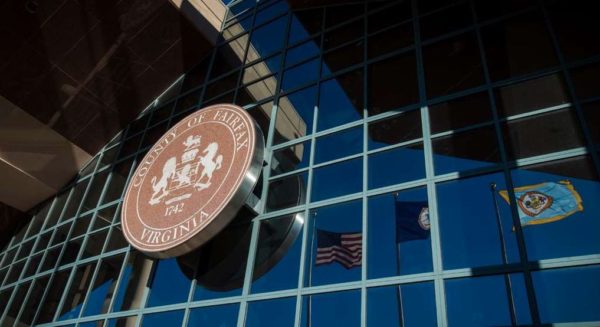
Fairfax County will use an estimated $10 million in COVID-19 relief money for another major grant program aimed at helping community partners keep their doors open.
The Board of Supervisors approved the Active and Thriving Community Grants Program at its meeting yesterday (Tuesday), where grants will range from $2,000 to $18,000 depending on the size of the business or nonprofit.
While businesses have pushed to reopen, many continue to struggle, and COVID-19 concerns persist. The grants target child care providers, community-based safety net providers, youth recreational or educational programs, youth athletic groups, and pools.
“As someone who visits a child care center everyday, they’re still operating under COVID restrictions that other businesses aren’t,” Braddock District Supervisor James Walkinshaw said during the board meeting. “So, they’re still dealing with that in terms of capacity and PPE [personal protective equipment] and masking.”
County staff reported that many community-based organizations “continue to struggle economically” due to COVID-19 and most have had to cancel or significantly alter major fundraising events.
“For many, giving levels have not returned to prior levels,” county staff wrote in the meeting agenda. “For many donors, giving patterns have changed. Even where giving has increased, it has not made up for lost revenue or increased expenses.”
Fairfax County Neighborhood and Community Services Deputy Director Sarah Allen told the board that the application period for the new grant program will launch by the end of August.
To be eligible, recipients will be required to show that they had a 15% decline in gross revenue in 2020 compared to 2019 or a 15% increase in expenditures directly tied to costs due to the pandemic.
The new grants are projected to allocate:
- $4.3 million for child care providers
- $1.9 million for community-based safety net providers
- $1.8 million for youth recreational or educational programs
- $1.5 million for youth athletic organizations
- $500,000 for pools
“A lot of these organizations survived through the pandemic because the…volunteer board members or the parents or community members involved dipped into their own pockets to keep things going so they didn’t have to go out of business,” Walkinshaw said.
The money comes as the county is finalizing awards for its PIVOT program, which will provide over $24.4 million in grants from the American Rescue Plan Act to businesses in the retail, food, and lodging sectors and other organizations financially affected by the pandemic.
When the county created the PIVOT program on June 8, staff were also looking for ways to provide additional assistance. A county survey of child care programs conducted in March found that over half of respondents did not know how long they would be able to stay open without financial support.
“The potential closure of child care programs could come at a time when more parents are returning to work, impacting working parents and their children, employers, and the child care workforce and their families,” the staff report said.
In awarding the grants, the county expects to use a priority measure related to vulnerable populations to pick recipients in the child care and pool categories. The remaining awards would be determined by a lottery system.
It wasn’t immediately clear how exactly the priority measure would work, but the county said staff will look at the social and economic conditions that made populations more vulnerable to COVID-19 as well as recent economic, health, and other data relevant to the pandemic’s impact.
Similar to the PIVOT grants, the county will use a third-party vendor — the Latino Economic Development Corp. — for the online grant administration portal and awards. Advertising and outreach in multiple languages will begin before the August launch.
“This grant program will prioritize disproportionately impacted populations and communities wherever possible,” county staff said.
Photo via Fairfax County/Facebook
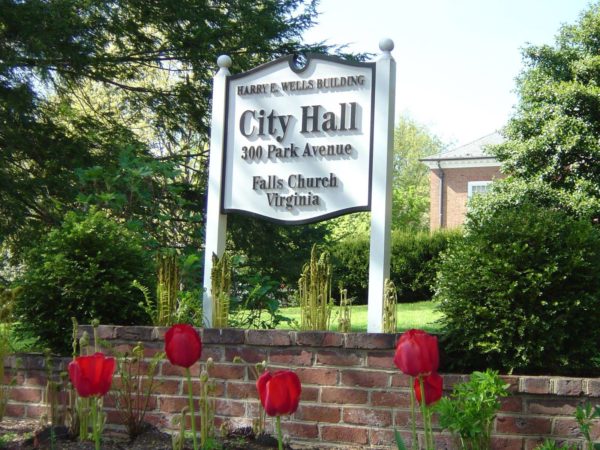
When it comes to municipal spending, $18 million in two years seems like pocket change, but for a smaller locality like the City of Falls Church, it represents a rare opportunity to address critical needs outside the constraints of a limited budget.
That’s how much money Falls Church has been allocated from the American Rescue Plan Act (ARPA), the COVID-19 relief package signed into law on March 11. The city received a first installment of $9 million in June and anticipates getting the other $9 million around this time next year.
Now, the Falls Church City Council must decide how to use the federal funding, which must be allotted by December 2024 and spent by December 2026, city staff told the council during a work session last Monday (July 19).
“Just in terms of engaging the public, this is a really important process for the city,” Falls Church City Manager Wyatt Shields said. “One of our goals is to act quickly on some immediate things that we need to put funding for, but also take a reasonable amount of time to think about the big picture and make sure we’ve considered all options before we start allocating big chunks of the dollars.”
The U.S. Treasury allows Coronavirus State and Local Fiscal Recovery Fund dollars from ARPA to be spent in four ways:
- To address the COVID-19 public health emergency and related economic fallout
- To give eligible public workers additional pay
- To replace lost revenue needed to provide government services
- To support water, sewer, and broadband infrastructure
In preliminary discussions before the work session, Falls Church City staff identified sewer infrastructure projects and public space improvements as top priorities based on their anticipated long-term impact and social equity considerations, according to a memo to the council.
Financing existing stormwater and sanitary sewer projects was easily the highest-scored option on staff’s list of funding priorities, followed by increasing broadband access for underserved populations and rebuilding the city’s property yard to accommodate an emergency operations center.
The proposed improvements to public spaces include upgrades at Berman Park, which is on the Fiscal Year 2022-2027 Capital Improvements Program for new play equipment, and a permanent stage for the barn in Cherry Hill Park. The list also suggests creating large outdoor classrooms with roofs and supporting dog parks, citing their mental health benefits.
Councilmember Letty Hardi suggested that the city consider how to add more public space in addition to improving existing spaces.
“If nothing else, we’ve learned from the public health crisis that being outdoors is good for everybody’s health, so it’s not just improving it, but how do we add spaces?” she said. “How do we add more green space to the city, and how do we use ARPA dollars to do that?”
She also expressed support for using federal relief money to help schools open full-time this fall, provide more one-on-one COVID-19 vaccination outreach, enhance childcare services, and enable businesses to operate permanent outdoor spaces. Read More
The Fairfax County School Board approved a framework yesterday (Thursday) to seek federal COVID-19 money, with the stipulation that it gets increased oversight and input on how the money will be spent.
The roughly $189 million plan would start with the upcoming school year and extend to June 2024. It is intended to help Fairfax County Public Schools respond to issues stemming from the pandemic.
“While we did have a public hearing about where people would like us to target our monies, we have not had the opportunity to get the greater details from the superintendent and his team,” Braddock District Representative Megan McLaughlin said.
The school board thanked district administrators for developing the Elementary and Secondary School Emergency Relief (ESSER) framework after learning about the incoming funds in May, but several board officials questioned whether the proposal was sufficiently detailed and provided enough accountability.
“The ESSER funds are unlike other funding by the federal government in that it has a requirement to have extensive community input and outreach,” Mount Vernon District Representative Karen Corbett-Sanders said.
The ESSER III money will support school operations, cover increased workloads for Individualized Education Program (IEP) staff, aid academic interventions, address students’ social and emotional needs, help with translation services for students, and more.
The largest costs, as identified by district staff so far, would involve:
- $54.9 million for academic intervention
- $46.2 million for special education teacher contracts
- $23.3 million for social and emotional learning needs
- Nearly $20.2 million for summer 2022 learning
- Nearly $14 million for afterschool programming and transportation
According to an FCPS presentation about the program, the ESSER money should address the impacts of the pandemic especially for students who have been disproportionately affected, and at least 20% must be used to address learning loss, among other rules.
The money will come through the Virginia Department of Education from the American Rescue Plan Act that was passed by Congress and signed into law in March.
Corbett-Sanders said FCPS faces an Aug. 1 deadline for submitting a general framework to the state before giving a more specific plan for how it will spend the funds by Sept. 1.
“Rather than just greenlighting, ‘They’re giving us $188.6 million, we’re going to put it in a line item list,’ we felt that it was important to have a little bit more comprehensive planning around the ESSER funds grant,” Corbett-Sanders said.
With the board’s initial approval, Superintendent Scott Brabrand will present an official ESSER III plan prior to the board’s Aug. 26 business meeting. He will present more detailed information, including targeted goals, operational timelines, and accountability metrics in a September work session.
The board’s motion also stipulated that state-filed amendments to the plan that reach $100,000 or more must be authorized by the board.
The Town of Vienna is receiving a huge tranche of money from the American Rescue Plan Act (ARPA), but it’s still unclear where that funding is going.
The Vienna Town Council formally accepted $8.5 million in ARPA funding this year on Monday (July 12). The town is expected to get an identical amount in funding next year.
Marion Serfass, the town’s director of finance, told Tysons Reporter that Vienna staff will be working over the next few months to gather public input to help determine where that funding would be best utilized.
The town will hold a public hearing on Aug. 30 to collect feedback on what issues locals would like to see that funding put toward, and the town council will have a conference on Sept. 20 to pin down a definitive list of where the $8.5 million is going.
Serfass told the town council on Monday that the advice she has received in conferences about the funding is to “take your time, be deliberate, and look at transforming projects.”
Serfass said her office is currently working with the town attorney to pin down what is or isn’t eligible for ARPA funding. The town could also get ideas, she said, for how to proceed from watching where other localities spend their ARPA funds.
Nearby, Alexandria received $29.8 million in its first tranche. The city spent the most — $4 million — on rental assistance and other emergency assistance programs. $3.7 million went to stormwater repairs and $3 million to a pilot program to guarantee a minimum income for city residents.
Looking long-term, Serfass told the town council that there’s no set deadline to spend the funding, giving Vienna room to invest in longer-term programs without putting next year’s tranche of funding at risk.

(Updated at 4:55 p.m.) Two technology companies in Tysons have each received $100,000 grants as part of a new state initiative intended to support projects that turn research into commercial products or services.
Gov. Ralph Northam announced yesterday (Monday) that Virginia will award $3.4 million in grants to 34 small, technology-focused businesses for the inaugural round of the Commonwealth Commercialization Fund (CCF), which launched in 2020 to help advance promising technology through the development process.
The Tysons-based recipients are the cybersecurity company Onclave Networks Inc. and Jeeva Informatics Solutions Inc., which is developing a cloud platform to help medical researchers recruit and work with patients for clinical trials.
“Facilitating research breakthroughs and getting new technologies out of the lab and into the hands of consumers is key to driving economic growth and creating jobs in the Commonwealth,” Northam said in the news release. “I am confident this first round of CCF awards will produce far-reaching benefits and congratulate these innovators and entrepreneurs on their success in developing transformative solutions to improve lives and address some of the most pressing challenges we face.”
The CCF consolidated Virginia’s existing Commonwealth Research Commercialization Fund and Virginia Research Investment Fund. Each of the Fiscal Year 2021 recipients received $100,000 and will provide matching funds.
According to the news release from the governor’s office, the fund focuses on technology “with a high potential for economic development and job creation” and that “position the Commonwealth as a national leader in science- and technology-based research, development, and commercialization.”
Onclave received a grant for its Zero Trust network, which aims to allow for remote communications and operations of “smart” infrastructure, such as telemedicine services or autonomous transportation, while providing protection from security threats.
The company previously received funding from the 2020 Commonwealth Research Commercialization Fund and was selected to participate in the Smart City Works accelerator program as a winner of Fairfax County’s first Smart City Challenge in March.
Onclave is also working with the Center for Innovative Technology to deploy its technology at the Virginia Smart Community Testbed in Stafford County.
“We have repeatedly seen how important it is to secure not just our devices and networks, but the data as well,” CIT Chief Technology Officer David Ihrie said in a statement. “As the Internet of Things continues to rapidly expand, cybersecurity solutions like Onclave’s Zero Trust platform are essential foundational elements of our new digital infrastructure.”
Other Fairfax County recipients of CCF funding include AtWork Systems and Rimstorm Inc. in Herndon as well as Service Robotics & Technologies in Springfield and Keshif in Alexandria.
“The Fairfax County Economic Development Authority applauds the granting of the inaugural round of the Commonwealth Commercialization Fund awards, including to the 6 Fairfax County-area-based companies,” Fairfax County Economic Development President and CEO Victor Hoskins said by email. “The CCF awards will provide funding support to spur research commercialization, with the intent of technological development leading to economic growth in Virginia.”
Photo via Alesia Kazantceva/Unsplash

County Leaders Frustrated by State Funding for Prosecutors — Fairfax County leaders say Virginia’s current formula to determine funding for Commonwealth’s Attorney offices undermines criminal justice reform efforts by rewarding localities that seek incarceration over diversion. A 15-month, state-commissioned study of the issue is set to launch this month. [The Washington Post]
Progress on Unemployment Rate Stalls — “Like much of Northern Virginia, Fairfax County’s jobless rate has improved substantially from the depths of the COVID crisis a year before, but now seems struck in neutral as it attempts to return to pre-pandemic lows…Fairfax’s jobless rate of 3.7 percent in May was up a tick from 3.6 a month before, according to figures reported June 30 by the Virginia Employment Commission.” [Sun Gazette/Inside NoVA]
Tysons-Based Engineering Contractor Acquired — “Newport News-based Fortune 500 military shipbuilder Huntington Ingalls Industries will acquire McLean-based defense contractor Alion Science and Technology Corp. from Veritas Capital in a $1.65 billion, all-cash deal, HII announced in a news release Tuesday. The deal is expected to close by the end of this year.” [Virginia Business]
County to Hold Virtual Meeting on Strategic Plan — “Join us July 21 for a virtual community conversation to share your thoughts on the Fairfax Countywide Strategic Plan as we move forward to shape the future of Fairfax County together. Register online.” [Fairfax County Government/Twitter]
Updated at 3:00 p.m. — The Town of Vienna has postponed its Arbor Day celebration again, citing inclement weather that is supposed to hit Fairfax County this afternoon.
The tree planting will now take place at 4:30 pm on Thursday (May 6).
Earlier: The Weekly Planner is a roundup of interesting events coming up over the next week in the Tysons area.
We’ve searched the web for events of note in Tysons, Vienna, Merrifield, McLean, and Falls Church. Know of any we’ve missed? Tell us!
Monday (May 3)
- Arbor Day Tree Planting — 4:30 p.m. at Southside Park (1317 Ross Dr. SW) — The Town of Vienna will celebrate Arbor Day by planting a tree at Southside Park. This ceremony was originally scheduled to take place last Friday (April 30), but it got postponed due to the windy weather. (Update: This event has been postponed to 4:30 p.m. on Thursday.)
Tuesday (May 4)
- Family PASS 5th Annual Golf Benefit — 12 p.m. at Westfields Golf Club (13940 Balmoral Greens Ave.) — The fifth annual Family PASS Golf Tournament will be held at the Westfields Golf Club in Clifton to support working families facing homelessness in Fairfax County. There will be prizes for the top three teams, along with various other contests. Register and donate online to support this cause.
- Fit4Mom Stroller Strides — 9:30-10:30 a.m. at the Mosaic District (2910 District Ave.) — Fit4Mom Stroller Strides is a total-body workout for moms with their kids in tow. The 60-minute workout includes strength training, cardio, and core restoration, along with entertainment for the little ones in your stroller. The class will meet in Strawberry Park in front of Mom & Pop. Register online for the class. Your first session is free.
- Town Election Day — 6 a.m.-7 p.m. at the Vienna Community Center (120 Cherry St. SE) — Three seats on the Vienna Town Council are up for election. Residents of the Town of Vienna who are registered to vote can cast a ballot in person at the Vienna Community Center. Voters must show a valid form of ID to cast a ballot. Call 703-255-6303 for more information.
Wednesday (May 5)
- Cinco de Mayo at Urbano Mosaic — 12-9 p.m. at Urbano (2985 District Ave.) — Eat, drink, and dance to celebrate Cinco de Mayo at the Mosaic District. There will be outdoor events with some tent coverage. A live DJ will be playing from 4 to 6 p.m., and a live band will perform from 6 to 9 p.m. Tickets are on sale for food and drinks, and guests must be over 21 years old to enter the party.
Thursday (May 6)
- Intentional Gardening: Make Way for the Pollinators (Online) — 7-8 p.m. — Master gardeners and Habitat Restoration Team members Sandy Tarpinian and Amy Crumpton lead the second session of Falls Church City’s three-part series about how gardeners can help create a healthy habitat for humans and wildlife. Email Marshall Webster at [email protected] to get the Zoom link.
Friday (May 7)
- URBNmarket Spring Pop Up Market — 3-8 p.m. at the Mosaic District (2905 District Ave.) — The URBNmarket is back at the Mosaic District. Started in 2014, the pop-up crafts market features home decor, jewelry, toys, clothes, and more from artisans, collectors, and creators in the D.C. area. The market will also appear on Saturday from 11 a.m. to 7 p.m.
Saturday (May 8)
- Pups & Pints — 12-7 p.m. at the McLean Metro station (1820 Dolley Madison Blvd.) — For a second weekend, Capital One Center will convert the McLean Metro station parking lot into a pop-up dog park and beer garden. The event features live music, food trucks, a puppy parade, a Mutt Strutt contest, and vendors with dog-centric products and services. Advance registration for a time slot is required to ensure adequate social distancing on the site.
Sunday (May 9)
- Virtual Mother’s Day Tea: Bringing Up Baby (Online) — 3 p.m. — Hosted by Green Spring Gardens, this virtual tea will focus on parenting through history. Learn about the child-rearing advice from the past that would shock and amuse us today. Register online for the Zoom link. Call 703-941-7987 for more information.
When former Vienna Town Councilmember Maud Robinson died in 2019, she set aside much of her estate to pay for sidewalks throughout town.
At the time, town staff projected that the money would fund 22 stretches of sidewalk totaling about 3.3 miles. Vienna would front the costs for these projects and accept the trust in the form of reimbursement.
Two years later, the town council has approved four eligible roads but have deferred six others in response to objections from neighbors, who have argued that the sidewalks are unnecessary, would encroach on precious driveway space, affect their trees, or place a burden on residents to maintain them.
At this rate, those close to the initiative are feeling the pressure of a deadline. Vienna has until fall 2024 to use up the Maud Ferris Robinson Charitable Trust.
Town staff estimate it could take up to two years after a street is identified to complete a project, and no construction has started, meaning no money can be transferred. A few town council candidates have also highlighted the importance of using the bequest.
“We are remaining optimistic [but] we do know we need to hit the accelerator button on that a little bit,” Vienna Public Works Director Michael Gallagher said.
The town is poised to take a step forward soon, with several sidewalk projects set to go before the Vienna Town Council next Monday.
Two are designed and ready for construction, which would cost nearly $320,000 combined, and there will be a public hearing for nine other projects.
Those nearing the construction phase are Cabin Road SE from Glyndon Street to Branch Road and Pleasant Street SW from east of Maple Avenue to Surveyors Court. Another two could be ready for final approvals in May, according to Gallagher.
The nine slated for a public hearing and the first round of approvals are:
- Alma Street SE — Delano Drive to Follin Lane
- Birch Street SW — Battle Street to Plum Street SW
- Blackstone Terrace NW — Holmes Drive to Lawyers Road
- Charles Street SE — Locust Street to Branch Road
- Cherry Circle SW — Cottage Street to end
- Elmar Drive SE/SW — DeSale Street to Park Street
- Oak Street SW — Birch Street to Center Street
- Symphony Circle SW — Melody Lane to end
- Timber Lane SW — Tapawingo Road to Harmony Drive
Even though it seems like it’s moving slowly, Andrew Jinks, Vienna’s transportation engineer, says the timeline will still be shorter because the town will not have to do the time-consuming work of navigating state and federal regulations.
“That is a significant benefit,” he said. Read More
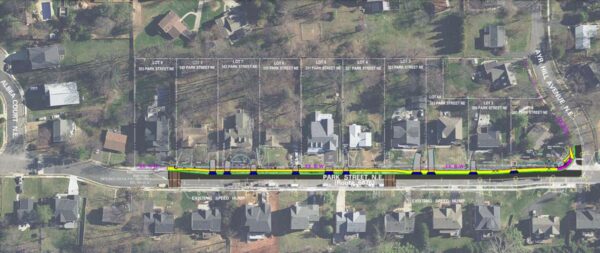
The Vienna Town Council authorized funds for two sidewalk improvement projects last week, paving the way for the town to create a more integrated sidewalk network.
First, the council voted unanimously on March 22 to approve an additional $61,000 for the town’s Park Street NE sidewalk project, which will close an approximately 850-foot gap between Ayr Hill Avenue and Albea Court NE with five-foot-wide concrete sidewalks, including curb and gutters.
In the works since at least 2016, the project’s total estimated cost of $855,104 is being funded by a Virginia Department of Transportation transportation alternatives grant. The grant requires a 20% local match, which Vienna is providing through its Northern Virginia Transportation Authority funds.
The additional $61,000 is needed to pay a contracted construction management firm Whitman, Requardt & Associates for right-of-way services. The project will require 10 temporary property acquisitions to accommodate construction, according to a scope-of-work document from the town.
Vienna Director of Public Works Mike Gallagher says the town previously expected to be able to handle the right-of-way process on its own or with “limited consultant help.”
“For town and state projects, we’re very fortunate in the town. The citizens and adjoining property owners routinely sign temporary easements if it’s necessary,” Town Attorney Steven Briglia said. “Most times, we just use right-of-way agreements so it’s not recorded and a cloud on their title.”
However, this project requires more formal right-of-way agreements, even though the takes aren’t permanent, because the VDOT grant includes federal funding. That means it has to adhere to the “complicated and time-consuming” process set by the Uniform Relocation Assistance and Real Property Acquisition Policies Act, Vienna town staff say.
Gallagher assured the town council that the public works department will not need any more money for the Park Street sidewalk project, stating that the new funding request is likely for more than they will actually need.
“I know that the project is budgeted higher than what we projected the cost to be, so there’s sufficient funds,” he said.
The Vienna Town Council also approved a $1.4 million construction contract for a project to replace an existing asphalt trail on Old Courthouse Road with approximately 500 linear feet of concrete sidewalk, closing a gap between Gosnell Road and Pine Valley Drive.
The project will also add curbs and gutters with drainage improvements to eliminate a ditch alongside the roadway.
The contract went to Sagres Construction, which submitted a bid of roughly $1.2 million, the lowest amount out of the six vendors that responded to the town’s invitation to bid. The approved funding includes a 10% contingency.
Initiated in 2013, the Old Courthouse project is divided into two phases since a portion of the road extends outside of town limits into Fairfax County. The Vienna Town Council approved an agreement with the county to get $2.3 million for construction funding in January 2019.
The Town of Vienna has prioritized filling in gaps in its sidewalks to improve the town’s walkability. A gift from the late Councilmember Maud Robinson enabled the town to establish a dedicated fund for sidewalk construction, though the Park Street and Old Courthouse projects don’t qualify since they are getting funding from elsewhere.
The town council also voted in February to require developers of single-lot properties to construct a sidewalk regardless of whether sidewalks exist on adjacent lots.
Map via Google Maps


